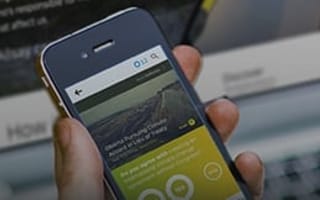[ibimage==36789==Original==none==self==ibimage_align-center]
Geoff Campbell hopes to contribute a new item to 21st-century startup nomenclature: “crowdfluence.”
A portmanteau of “crowdsource” and “influence,” it refers to the act of collecting popular opinions on a daily basis and delivering them to decision-makers — and it’s the heart of Campbell’s new app, AllSay.
AllSay is a real-time voting vehicle, generating tailored yes-or-no questions based on information a user has shared. Starting with a user’s zip code, the app populates questions related to local, statewide, and national news. (Examples include “Do you agree with funding school construction through grants based on enrollment?” and “Do you agree with the FCC’s law to not block Wi-Fi signals?”). Users can submit additional qualities and interests — such as whether they have children, or if they’re interested in environmental conservation, education reform, or the latest developments in the NFL — to increase the questions’ relevance.
If particular issues receive a comparably high degree of attention, Campbell said, AllSay’s next step is to alert the appropriate governing bodies. The staff searches for contact information online, and, once secured, sends the data, including sample size, user profiles and activity, and the exact questions asked. If an authority shows interest in the popular opinion on a specific issue, AllSay notifies users who’ve voted with an update.
“We give influencers and decision makers the ability to draw their own conclusions on what the data means,” Campbell said. “And that’s the most important thing for us: that people use and interpret the data as they see fit.”
But if the company has no official governmental connections, how does it devise these questions in the first place?
“We have a content team dedicated to surfacing relevant decisions from current news coverage in their area who are trained to reduce bias to the greatest extent possible,” Campbell explained. “Fortunately for us, we live in a world in which news coverage from reliable and reputable sources is not only continuous but also highly localized. What this means is that we’re able to let news reports do the work of explaining the decisions to you.”
[ibimage==36790==Original==none==self==ibimage_align-center]
Though based in Los Angeles and New York, the startup seems to be steadily going national, serving a selection of regions in California, the South, the Midwest, and the East Coast. “But it’s important to note that there’s a pretty high degree of flexibility, geographically speaking, since someone who lives in L.A. might work in Anaheim, or someone who works in Long Beach might live in the Valley. So we cast a wider net to take into account this overlap of areas of interest,” he said.
But before expanding any further, Campbell said the company will focus on features and functionality, including decision-sharing capabilities. He also noted that the startup would announce “some recognized partner organizations,” whose interest in the app’s consumer data will likely prove an asset to its revenue model.
Leveraging its near-national presence and expanding network of visibility, the company will continue to work toward its professed aim: to direct more power into the hands of individuals when it comes to legislating everyday experiences.
“Right now, other people are making decisions which affect our lives every day. We want as many of us who want to be a part of that decision to have a say in it, so they can be included in the process. We believe everyone benefits when that happens – both the people affected by decisions and those making them.”



